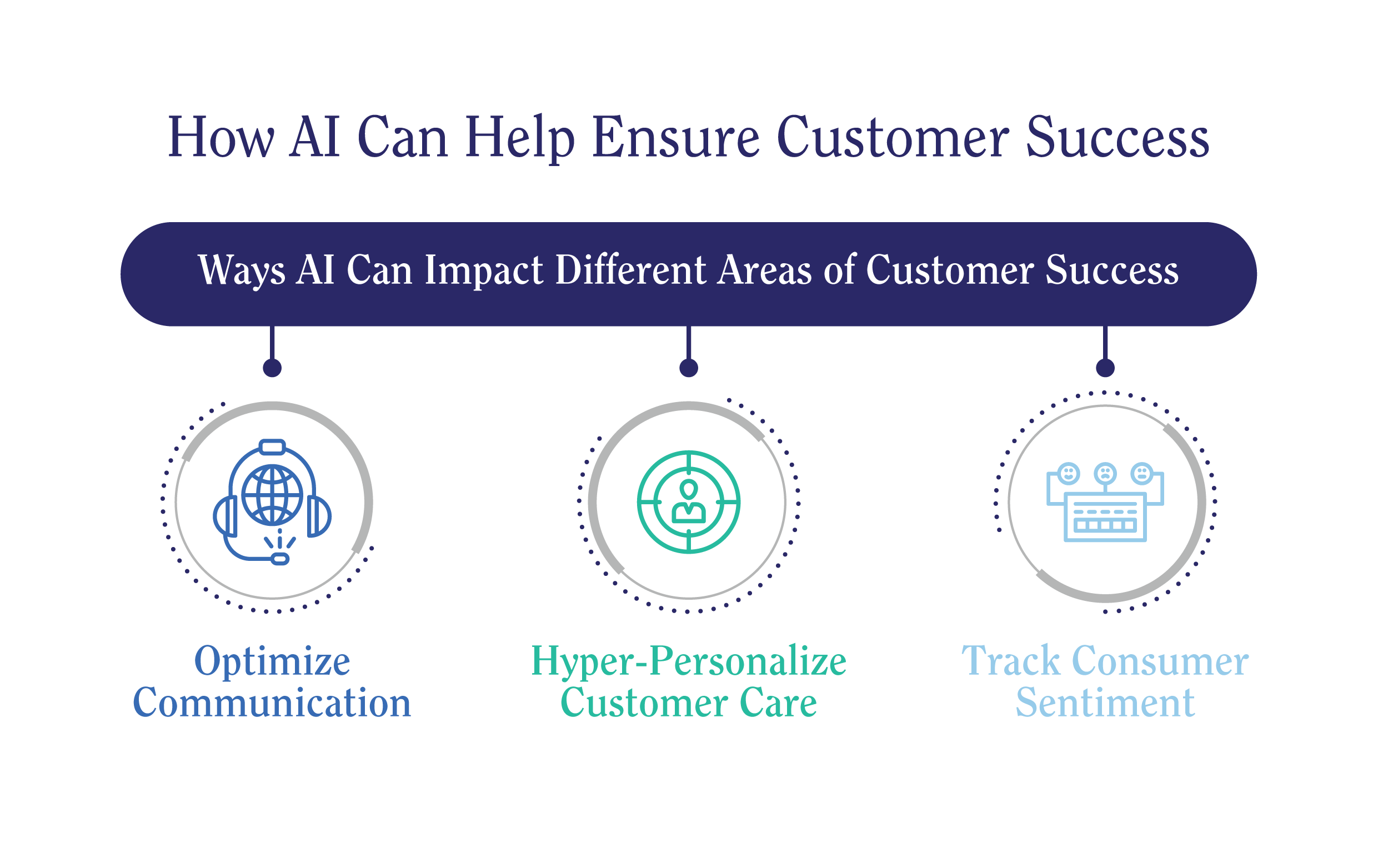How AI Brings a Positive Impact to Customer Success
You can’t have business success without customer success. However, customer success teams struggle every day to understand what customers want and how to improve the overall customer experience. They spend much of their time on repetitive tasks, leaving them less time to improve customer relationships and maximize lifetime value. However, customer success teams don’t have to spend their time overcoming these challenges. AI can help them get back to what they do best — helping customers!
How AI Can Help Ensure Customer Success
You can apply AI to many areas of customer success, helping customers better and faster than ever before.
1. Optimize Communication
Customer success depends on effective communication between the business and its customers. And today, businesses can communicate with customers in so many ways — e.g., emails, texts, call centers, chatbots, live chat. In essence, customers expect clear communication using the channels they prefer. Many companies fail, however, to communicate clearly or promptly with their customers. With AI, you can make a positive impact in many areas of communication:
Enhanced Question-Answering: With AI, you can automate and improve question-answering processes, giving advisors or employees more time to work on core tasks. For example, we worked with the Flanders Investment and Trade (FIT) team to create an AI-driven question-answering process. This process allows FIT to provide accurate, actionable, and timely answers to clients’ questions.
Automated Email Processing: AI can be used to automatically sort and distribute incoming emails based on keywords and content, routing them to the right departments and agents. The AI solution can also prioritize emails, ensuring that customers who need help receive responses quickly.
Call Center Routing and Coaching: You can implement intelligent call routing where calls automatically go to the agents that can best handle them. AI can route calls based on emotions, sending angry customers to supervisors with calming voices, for example. Another opportunity is real-time call agent coaching where the AI advises supervisors to provide coaching on live calls when needed, improving agent performance and customer outcomes.
Conversational AI: You can implement well-designed conversational AI solutions that engage with customers or clients in an enjoyable and informative way. For example, a bank might create an AI-powered chatbot that answers customers’ questions like, “what is my checking account balance?” or “what is the minimum monthly payment for my credit card?”
 2. Hyper-Personalize Customer Care
2. Hyper-Personalize Customer Care
We all know the importance of personalization and that consumers expect it from businesses, especially on digital channels. When consumers engage with a brand, they expect to see personalization with nearly every interaction. And thanks to a wealth of customer data and access to AI solutions, companies can serve each customer in an intimate and hyper-personal way across all channels.
So, how do you hyper-personalize customer care? You do it via:
Predictive Personalization: Analyze real-time and historical shopper behavior to identify opportunities to proactively help customers based on their unique needs. Engage with customers before they even realize they need your help!
Intelligent Recommendations: Provide intelligent and personalized recommendations in real-time. We worked with the team at Belga News Agency to create an AI feature that enables their news app Belgapress to give clients personalized, real-time access to the latest news.
Personalized Support: Superpower customer support agents with real-time customer data provided through an easy-to-use dashboard. Give agents the means to provide personalized support to every customer — gaining customer trust and brand loyalty.
You can apply personalization across the entire customer experience automatically with AI.
 3. Track Consumer Sentiment
3. Track Consumer Sentiment
You can’t please consumers if you don’t know how they feel about your products or trends in your industry. Imagine releasing a new product that you think is great, but consumers flock to social media sites to complain about how much they don’t like it?
You can use AI to monitor and analyze posts on social media websites, forums, and blogs — we call this social listening — discovering what people think about specific products and topics. You can use social listening to monitor and track the sentiment for all kinds of products and services — meals at restaurants, designer shoes, celebrity fragrances, high-tech smartphones, vacation packages, to name a few.
Let’s say you’ve recently launched a new line of designer handbags or shoes. You could use social listening to find out what people think about your latest contributions to high fashion. If you’re a B2B company selling electronics or software, you could monitor social media channels to see what your competitors are doing or find potential buyers for your products.
 Social listening also applies well to other industries like life sciences. For example, a life sciences company could use AI-driven social listening to track patient awareness and sentiment around specific diseases or medical treatments.
Social listening also applies well to other industries like life sciences. For example, a life sciences company could use AI-driven social listening to track patient awareness and sentiment around specific diseases or medical treatments.
Revolutionize Customer Success with AI
AI assists customer success teams in many ways so that they can understand customers and their concerns better and serve customers faster. It works alongside humans, providing information and assistance to customers 24/7 — with increased customer satisfaction and employee happiness as a result. AI lets you streamline entire workflows and boost efficiency with less effort on the part of your teams.
Want to take your customer success department to the next level?
Book a meeting with our specialist below to discover the opportunities!

